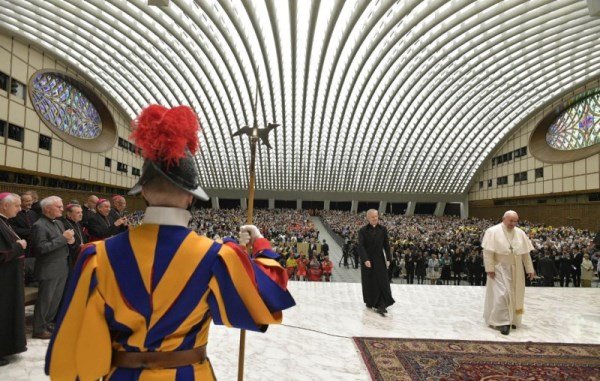In the reading of the Acts of the Apostles, the Gospel continues its journey in the world and the witness of Saint Paul is increasingly marked by the seal of suffering. But this is something that grows with time in the life of Paul. Paul is not only an evangeliser full of ardour, the intrepid missionary among the gentiles who gives life to new Christian communities, but also the suffering witness of the Risen One (see Acts 9: 15-16).
The arrival of the Apostle in Jerusalem, described in chapter 21 of the Acts, unleashes ferocious hatred towards him, and he was reproached: “But he was a persecutor! Do not trust him!”. As it was for Jesus, Jerusalem is also a hostile city for him. He went to the temple, was recognized, was taken out to be lynched, and was saved in extremis by the Roman soldiers. Accused of teaching against the Law and the Temple, he was arrested and began his peregrination as a prisoner, first before the Sanhedrin, then before the Roman procurator in Caesarea, and finally before King Agrippa. Luke highlights the similarity between Paul and Jesus, both hated by their adversaries, publicly accused and recognized as innocent by the imperial authorities; and so Paul is associated with the passion of his Master, and his passion becomes a living gospel. I come from Saint Peter’s Basilica, and there I had my first audience this morning with Ukrainian pilgrims from a Ukrainian diocese. How persecuted these people were; how much they have suffered for the Gospel! But they did not negotiate their faith. They are example. Today in the world, in Europe, many Christians are persecuted and give their lives for their faith, or are persecuted “with white gloves”, that is, set aside, marginalized... Martyrdom is the air of the life of a Christian, of a Christian community. There will always be martyrs among us: this is the sign that we are going on the way of Jesus. It is a blessing from the Lord, that there may be in the people of God, someone or someone who gives this witness of martyrdom.
Paul is called to defend himself against accusations, and in the end, in the presence of King Agrippa II, his apology turns into an effective witness of faith (cf. Acts 26: 1-23).
Then Paul recounts his own conversion: the Risen Christ made him a Christian and entrusted him with the mission among the nations, “that they may turn from darkness to light and from the power of Satan to God, that they may receive forgiveness of sins and a place among those who are sanctified by faith in me” (Acts 26: 18). Paul obeyed this role and did none other than demonstrate how the prophets and Moses foretold what he now announces: that “Christ must suffer and that, by being the first to rise from the dead, He would proclaim light both to our people and to the Gentiles” (v. 23). Paul’s passionate witness touches the heart of King Agrippa, who is lacking only the decisive step. And so the King says: “In a short time would you persuade me to be a Christian?” (v. 28). Paul was declared innocent, but could not be released because he appealed to Caesar. Thus continues the unstoppable journey of the Word of God to Rome. Paul, chained up, will end up here in Rome. Paul, in chains, will end up here in Rome.
From this moment on, the portrait of Paul is that of the prisoner whose chains are the sign of his fidelity to the Gospel and of the testimony he gave to the Risen One.
The chains are certainly a humiliating trial for the Apostle, who appears to the world as an “criminal” (2 Tim 2:9). But his love for Christ is so strong that even these chains are interpreted with the eyes of faith; faith that for Paul is not “a theory, an opinion about God and the world”, but “the impact of God’s love in his heart [...] was love for Jesus Christ” (Benedict XVI, Homily on the occasion of the Pauline Year, 28 June 2008).
Dear brothers and sisters, Paul teaches us perseverance in trial and the ability to read everything with the eyes of faith. Today let us ask the Lord, through the intercession of the Apostle, to revive our faith and help us to be faithful to the end of our vocation as Christians, as disciples of the Lord, as missionaries.
